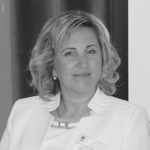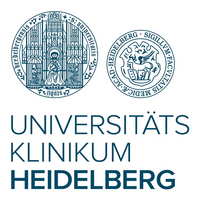NursingAI Team
Martina Hasseler (Project Coordinator)
Johanna Mink
Johanna Mink is a research fellow and a doctoral student at the Department of General Practice and Health Services Research, University Hospital Heidelberg, Germany. She is a trained Medical Technical Assistant for Functional Diagnostics and has studied English and Gerontology and, as minor subject, educational sciences at the University Heidelberg, completing with a Master equivalent degree. Her fields of study are interprofessional education and collaboration in health care and the accompanying evaluation of the Bachelor programme - Interprofessional Health Care and the Interprofessional Training Ward (HIPSTA) at the University Hospital Heidelberg. Further research interests are competency development, socialization and role clarification of pre- and post-graduate health care professionals, and the academization of education in health care.

Freda Vasse
Freda Vasse is an innovator in health care, an educational scientist, and an educational designer. She has extensive expertise in initial and vocational education in Nursing and Caregiving. She is also an expert in nursing job analysis. She developed and published a 3-Dimensional Workplace Learning questionnaire based on Lifelong learning theory of Knud Illeris and published about Nursing Professional Self concept. She designs and develops performance assessments (e.g. skills hierarchy assessment from novice to expert with a Gutmann scale) and automation of knowledge work/knowledge management systems.

Adrienn Siketné Újvári
Dr. Adrienn Siket, Ujváriné graduated as nurse with BSN, also holding degrees in pedagogy and health promotion, earned her doctorate as a nurse in health sciences from the University of Pécs, Hungary. She has been a regular faculty with the Faculty of Health at the University of Debrecen, Hungary since 1997 as associate and assistant professor in nursing. Currently, she is the program director of the Masters in Nursing and the Advanced Practice Nurse programs. She served for a period of 10 years as an external advisor to the National Institute of Primary Care where she had been coordinating the community nurse continuing education program. For the last 2 years she has been involved in the National Working Group for Strengthening Primary Care where she is responsible for the development of competencies and training for nurses in general practice. Her research has been addressing the advanced role of nurses in various healthcare delivery models as well as the role of motivation and organizational culture on nurses’ intent to leave the profession.

Miklós Zrínyi
Dr. Miklós Zrínyi, graduated as a clinical nurse (BSN) in Hungary in 1994. Worked as a staff nurse in hemodialysis care and moved to the US in 1995 to start his doctoral studies at Case Western Reserve University, Cleveland, Ohio. He earned his PhD in 1999 in nursing from the same university and shortly took the position of “technical officer” with the nursing and midwifery unit at the European Headquarters of the World Health Organization in Copenhagen. After a few years in the pharma sector, he returned to work for the World Health Organization in Geneva from 2002-2005. Since 2005 he has been employed by the pharma sector as business unit manager and commercial director in Teva Pharmaceuticals and recently by Clear Pharma. He has also been teaching nurses to research methods and statistics since 2010 at the master’s level in Hungary. He has published over 40 manuscripts as part of his scientific career.

Stefan Mol
Stefan Mol is an assistant professor in Organizational Behavior and Research Methods at the Amsterdam Business School of the University of Amsterdam and Co-founder of the Center of Job Knowledge Research. He received his Master's degree in psychology at the University of Amsterdam in 2000, and his PhD in psychology in 2007, at the Institute of Psychology of the Erasmus University Rotterdam. His dissertation consists of four studies investigating expatriate selection practices and one study aimed at assessing the performance of police trainees in South-Africa. His research collaborations have appeared in the Asian Journal of Social Psychology (2003), the European Journal of Work and Organizational Psychology (2013), Human Performance (2009), IEEE Transactions on Emerging Topics in Computing (2015), the International Journal of Intercultural Relations (2005), the International Journal of Knowledge and Learning (2012), the International Journal of Selection and Assessment (2009), the Journal of Cross-Cultural Psychology (2005; 2016), the Journal of Global Mobility (2013), the Journal of Learning Analytics (2014; 2016), the Journal of Vocational behavior (in press), Organizational Research Methods (2017; 2017), and several handbooks. In addition, Stefan was involved in the EU-Funded Leonardo da Vinci Ontohr (see www.ontohr.eu), Med-Assess (see www.med-assess.eu) and Ontotech (see www.ontotech.eu) projects. Especially his experiences in the Med-Assess and Pro-Nursing projects will be invaluable to the current endeavour, as these projects pertained directly to the skills assessment of nurses. From 2013-2017 Stefan was serving on the Board of Management and Supervisory Board of the FP7 Marie Curie Initial Training Network (ITN) Eduworks (see www.eduwork-snetwork.eu) a project aimed at the socio-economic and psychological dynamics of labour supply and demand matching processes at aggregated and disaggregated levels. Finally, Stefan was involved in the coordination of university wide project aimed at establishing Learning Analytics at the University of Amsterdam from 2013-2016, and its successor from 2017-2018.

Gábor Kismihók
Head of Learning Analytics research group. He concentrates his research efforts on matching processes between education, labour market, and individuals. Previously he co-founded the Center of Job Knowledge Research at the University of Amsterdam, and supervised there 5 PhD students in the fields of HRM - data science and learning analytics. He is also a regular supervisor of MSc and BSc student theses. He published his research in various peer-reviewed international journals and book chapters in the fields of Learning Analytics, Technology Enhanced Learning and Knowledge Management. In the past years he has been busy with various EU funded research projects (FP7, FP7 Marie Curie ITN, Lifelong Learning Programme) focused on employability, person - organization fit, mobile Learning Management System development, context aware educational systems and semantic technology in education. Besides scientific research, he has been managing large scale innovation networks (e.g. www.eduworks-network.eu) with a budget of 3,7M EUR (working staff of 25-30 people) and smaller scale innovation projects (e.g. www.ontohr.eu) with a budget of 500K EUR (working staff of 10-15 people). He has also been busy writing successful research project proposals (FP7, FP7 MC ITN, EU LLP, TAMOP). He is a member of expert panels reviewing proposals for EU funding.

Olga Lezhnina
After obtaining her first degree in physics (1995) and working for many years in education, Olga Lezhnina continued her career as an educational scientist. While in a master’s program (MSc. Psychology: Learning Sciences, LMU Munich), she worked as a tutor in statistics and was responsible for teaching students the fundamentals of statistical methodology and data analysis in R. After graduation, she was admitted to the TIB as a research assistant and a PhD student in Data Science, and currently she is involved in an interdisciplinary international Nursing AI project and also carries out an independent research applying statistical and machine learning models to a large-scale educational assessment dataset (PISA) in order to study the interactions between ICT-related factors.

Partners

Key Action: Cooperation for innovation and the exchange of good practices
Action Type: Strategic Partnerships for vocational education and training
Project Reference: 2018-1-DE02-KA202-005101
EU Grant: 279498 EUR





